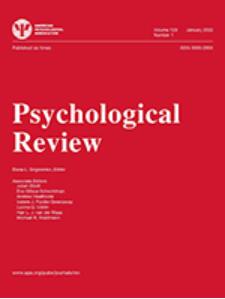社会探索:人们如何以及为何寻求新的联系。
IF 5.1
1区 心理学
Q1 PSYCHOLOGY
引用次数: 0
摘要
就像动物觅食一样,人类也在寻找社会关系。人们经常要在探索新关系与深化现有关系之间做出抉择。这种权衡在最优觅食理论中被称为探索-开发权衡,在动物觅食、学习和组织行为学等其他学科中也有突出表现。该框架的许多原理都可应用于人类对其社会资源的选择,我们称之为社会探索/开发。在社会探索/开发领域使用已知的原则可以帮助社会心理学家更好地理解人们如何以及为什么选择他们的人际关系,这些关系最终会影响他们的健康和幸福。在本文中,我们将讨论社会探索和社会利用的成本和收益。然后,我们综合了已知的个人和情境层面的社会决策预测因素,并用探索-剥削权衡的语言对其进行了重构。我们提出,当人们发现探索的回报更高、成本更低,而且环境中有很多探索机会时,他们就会进行更多的探索。最后,我们讨论了将最优觅食理论应用于社会决策所产生的假设。(PsycInfo Database Record (c) 2024 APA, 版权所有)。本文章由计算机程序翻译,如有差异,请以英文原文为准。
Social exploration: How and why people seek new connections.
Just as animals forage for food, humans forage for social connections. People often face a decision between exploring new relationships versus deepening existing ones. This trade-off, known in optimal foraging theory as the exploration-exploitation trade-off, is featured prominently in other disciplines such as animal foraging, learning, and organizational behavior. Many of the framework's principles can be applied to humans' choices about their social resources, which we call social exploration/exploitation. Using known principles in the domain of social exploration/exploitation can help social psychologists better understand how and why people choose their relationships, which ultimately affect their health and well-being. In this article, we discuss the costs and benefits of social exploration and social exploitation. We then synthesize known person- and situation-level predictors of social decision making, reframing them in the language of the explore-exploit trade-off. We propose that people explore more when they find it more rewarding and less costly, and when the environment has many opportunities to do so. We conclude by discussing hypotheses generated by applying optimal foraging theory to social decision making. (PsycInfo Database Record (c) 2024 APA, all rights reserved).
求助全文
通过发布文献求助,成功后即可免费获取论文全文。
去求助
来源期刊

Psychological review
医学-心理学
CiteScore
9.70
自引率
5.60%
发文量
97
期刊介绍:
Psychological Review publishes articles that make important theoretical contributions to any area of scientific psychology, including systematic evaluation of alternative theories.
 求助内容:
求助内容: 应助结果提醒方式:
应助结果提醒方式:


